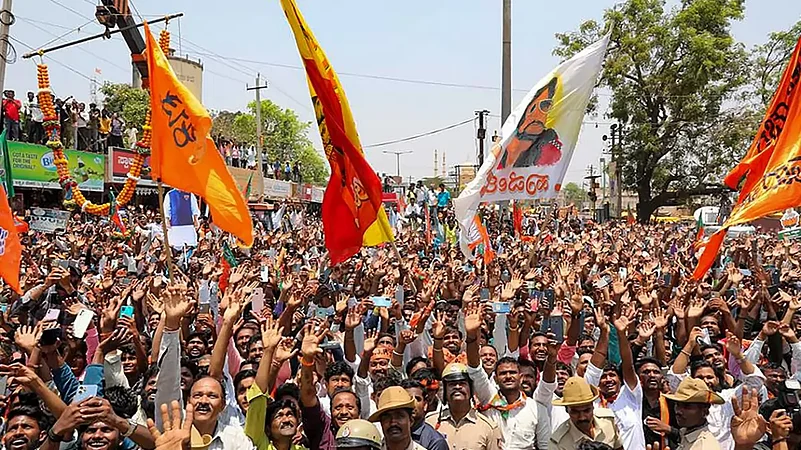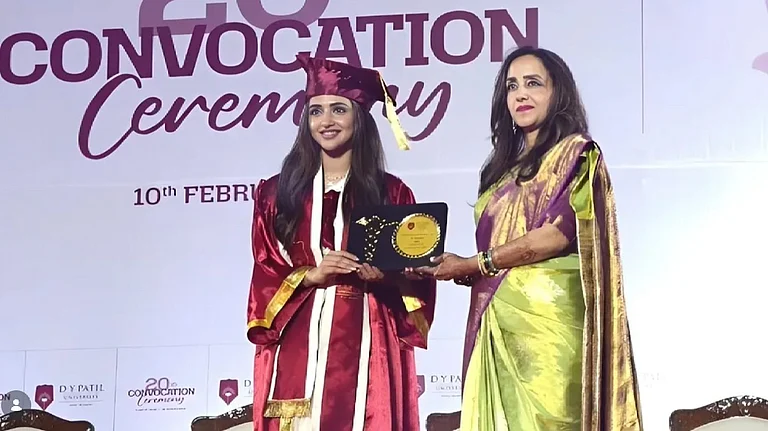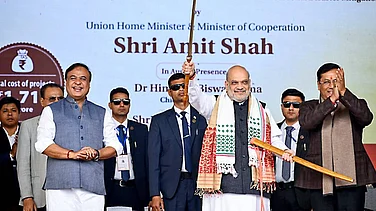Ahead of the Karnataka Elections slated for May 10, the exit of several top Lingayat leaders from the ruling BJP has been a growing challenge for the saffron party as it readies itself to go into the polls.
While the BJP turncoats have joined Congress, they have been sharpening their attacks on the Congress with CM Basavaraj Bommai stating that the opposition has now started following a “divide and rule” policy.
Further, rejecting speculations that the Karnataka Chief Minister would be replaced ahead of assembly polls next year, state BJP strongman B S Yediyurappa on Wednesday said Basavaraj Bommai will complete the term and no such discussions about a change has taken place in the party.
The former chief minister also said the party leadership will decide on the next state BJP president, once the incumbent Nalin Kumar Kateel's term is over, and that he and other state leaders will tour Karnataka with an aim to come back to power in the 2023 assembly polls.
Slammed by the Congress as the “puppet CM”, Bommai, who took over from Yediyurappa as Chief Minister, completed one year in office on July 28, last year.
1983
This was the first year when the BJP made its first entry into Karnataka politics when it won 18 seats after contesting 110 seats in the 224-Constituent Assembly. It garnered 7.93 per cent of the votes polled.
The saffron party wanted to tie up with the Janata Party, but it could not. However, it supported them from the outside. The Janata Party formed the government with Ramakrishna Hegde as the chief minister.
1985
During the 1985 elections, the BJP’s performance vote count dropped to 3.74 per cent with the Hegde government taking all the credit for the popularity of the Janata Party even though the BJP had extended its support towards it.
1989
The Congress defeated the Janata Dal during the 1989 state elections and came to power by winning 178 seats. The performance of the BJP remained almost the same, with an insignificant vote count, while Janata Dal won only two seats.
1994
The 1994 elections were a major mark of a slow-and-steady win for the BJP when it won 40 seats while Congress was defeated by the Janata Dal, which was carved out of the Janata Party. The Janata Dal, with 115 seats and 33.54 per cent votes formed the government in Karnataka.
1999
It was the year when Congress came back to power once again by winning 132 seats. The BJP contested the 1999 Karnataka Assembly election in alliance with the JD(U) as part of the NDA. While the BJP won 44 seats, it got more than 20 per cent votes for the first time.
2004
In the 2004 Karnataka Assembly election, the BJP emerged as the single largest party winning 79 seats. However, it could not form a government due to insufficient numbers while the Congress and the JD(S) formed a coalition government with Dharam Singh of the Congress as the chief minister.
2006 political turmoil
The turmoil the Karnataka politics shot off this year. In early 2006, the JD(S) withdrew support from the government and formed a coalition with the BJP. As per their agreement, Deve Gowda's son HD Kumaraswamy would be the CM for the first 20 months while BS Yediyurappa of the BJP would succeed him for the remaining 20 months.
Eventually, the alliance broke in October 2007 and Kumaraswamy refused to let Yediyurappa take over the government. President's Rule followed and subsequent elections were called.
2008
This is the first time that the BJP came to power without any coalition. Although it won 110 seats, it fell short of three MLAs. Eventually, it formed the government with the support of three independent MLAs.
Yediyurappa was sworn in as the chief minister of Karnataka. However, he was forced to resign in 2011, following his indictment by the Karnataka Lokayukta in an illegal iron ore export scam.
DV Sadananda Gowda replaced Yediyurappa as the CM. He too resigned in 2012 and was succeeded by Jagadish Shettar until the Assembly election in 2013.
2013
The Congress won a clear majority by winning 121 seats. Siddaramaiah was sworn in as the new chief minister of Karnataka. The BJP lost 72 seats as compared with the 1998 Assembly election to settle at 40 seats over allegations of corruption and inefficiency.
2018
The Congress was seeking re-election, having governed the state since elections in 2013, while the BJP attempted to regain office, having previously governed the state in 2007 and from 2008 to 2013. Congress and JD(S) formed a coalition government with 120 out of 224 seats. In the 2019 general election, the BJP-led NDA won 25 out of 28 seats in Karnataka while the INC-led UPA won two and 01 seats by Independent Candidate. The Aam Aadmi Party also made its debut in the state.
2019
The 2019 Karnataka political crisis was a period of political instability when members of the legislative assembly in Karnataka submitted their resignations, which led to the fall of the Congress-JD(S) coalition government in the state. After three weeks of turmoil, Kumarasamy lost a trust vote and resigned. On 26 July 2019, BS Yediyurappa was sworn in as Chief Minister of Karnataka once again.
2021
On July 26, 2021, BS Yediyurappa resigned as Chief Minister of Karnataka on the second anniversary of his term. Dharmendra Pradhan and G. Kishan Reddy were sent by the national leadership of the BJP to carry out the selection of the next chief minister. On 27 July 2021, Bommai was elected to the post. He was sworn in the next day as the 23rd Chief Minister of Karnataka, becoming the fourth chief minister from the Bharatiya Janata Party in the state.


























